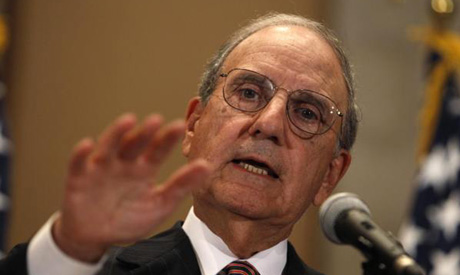
U.S. Middle East Envoy George Mitchell gestures during a news conference in Jerusalem in this September 15, 2010 file photo. Mitchell, who has led the Obama administration's unsuccessful effort to restart direct negotiations between Israel and the Palestinians, plans to resign, a U.S. official said on May 13, 2011.
REUTERS
The White House is expected to announce on Friday that the veteran mediator and broker of the Northern Ireland peace accord is stepping down for personal reasons, the officials told The Associated Press. The officials spoke on condition of anonymity ahead of the announcement. There are no imminent plans to announce a replacement for George Mitchell, the officials said, although his staff is expected to remain in place at least temporarily.
Mitchell's resignation comes at a critical time for the Middle East, which is embroiled in turmoil, and the Israeli-Palestinian peace process, which has been moribund since last September and is now further complicated by an agreement between Palestinian factions to share power.
Obama is expected to deliver a speech next week about his administration's views of developments in the region ahead of a visit to Washington by Israeli Prime Minister Benjamin Netanyahu.
Since his appointment on Obama's second full day in office in January 2009, Mitchell, 77, had spent much of his time shuttling between the Israelis, Palestinians and friendly Arab states in a bid to restart long-stalled peace talks that would create an independent Palestinian state. But in recent months, particularly after the upheaval in Arab countries that ousted longtime U.S. ally and key peace partner Hosni Mubarak from power in Egypt, his activity had slowed markedly.
Mitchell has led a long career as politician, businessman, congressional investigator and international mediator.
Upon being announced as the administration's point man for Mideast negotiations, he recalled his role in producing Northern Ireland's Good Friday peace accord in 1998.
"We had 700 days of failure and one day of success," he said. "For most of the time, progress was nonexistent or very slow." Mitchell believed his patience would serve him well in the Arab-Israeli conflict and its constant forward and backward steps. Speaking of the Northern Ireland conflict, he added: "I formed the conviction that there is no such thing as a conflict that can't be ended. Conflicts are created, conducted and sustained by human beings. They can be ended by human beings." Mitchell served in the Senate as a Democrat from 1980 to 1995, the final six years as majority leader. In 2000-01, he headed a fact-finding committee on Mideast violence that called for commitments by Israel and the Palestinian Authority to immediately and unconditionally end their fighting. The panel urged a cooling-off period and other steps toward peace, but it did not lead to lasting results.
The April 2001 Mitchell report asked Israel to freeze settlements in the West Bank and called on the Palestinians to prevent gunmen in Palestinian-populated areas from firing on Israeli towns and cities. The settlements, as well as Israeli concern over rocket and other attacks on its soil, remain sticking points today.
Short link: